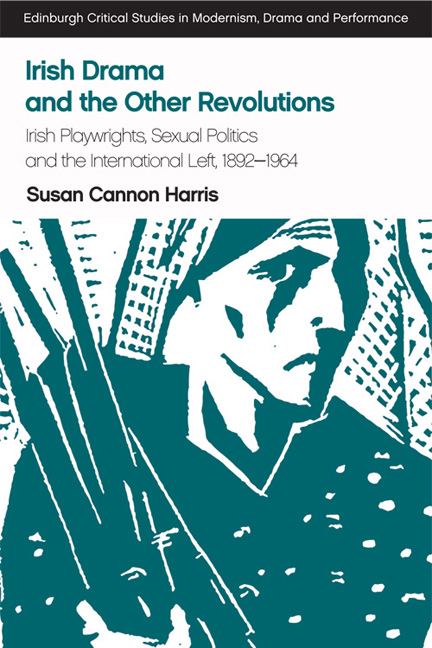 Irish Drama and the Other Revolutions
Irish Drama and the Other Revolutions Published online by Cambridge University Press: 06 January 2018
INTRODUCTION
On 28 March 1894, the day before W. B. Yeats saw a play of his produced for the first time, Yeats wrote to John O'Leary of his dreams for the future. Florence Farr, an English feminist turned actress, had persuaded the Manchester tea magnate Annie Horniman to subsidise a season of original plays in English that she would produce at the Avenue Theatre in London. Yeats's fellow-expatriate George Bernard Shaw was working on a comedy called Arms and the Man; but the first night would feature Yeats's one-act The Land of Heart's Desire, followed by John Todhunter's A Comedy of Sighs. If all went well, Yeats thought he might stay in London, and he hoped Farr would produce and star in a play he was writing. Yeats described this play – eventually titled The Shadowy Waters – as
a wild mystical thing carefully arranged to be an insult to the regular theatre goer who is hated by both of us. All the plays [Florence Farr] is arranging for are studied insults. Next year she might go to Dublin as all her playwrights by a curious chance are Irish. (Yeats, Collected Letters, I, 384)
This letter captures a moment when the future of literary drama in English is in flux. The Irish Literary Theatre is three years in the future. Although invested in the idea of an Irish literary revival, Yeats has been concentrating his efforts in London. He doesn't have an explanation for the ‘curious chance’ that brought three aspiring Irish playwrights together in London, or for what it means that Farr has attracted so much Irish talent to a venture with no national ambitions. For Yeats, insulting the ‘regular theatre goer’ is the project that holds the Avenue Theatre season together. The Irishness of the participants matters less than Farr's challenge to commercial theatre.
The future Yeats imagines here did not materialise. On opening night, Todhunter's A Comedy of Sighs met with a catastrophically hostile reception. When equally hostile reviews appeared the following morning, Shaw's Arms and the Man was rushed into production. Arms replaced Comedy on April 21. Yeats's Land of Heart's Desire was soon replaced with The Man in the Street, a one-act comedy by a seasoned London hack named Louis N. Parker.
To save this book to your Kindle, first ensure [email protected] is added to your Approved Personal Document E-mail List under your Personal Document Settings on the Manage Your Content and Devices page of your Amazon account. Then enter the ‘name’ part of your Kindle email address below. Find out more about saving to your Kindle.
Note you can select to save to either the @free.kindle.com or @kindle.com variations. ‘@free.kindle.com’ emails are free but can only be saved to your device when it is connected to wi-fi. ‘@kindle.com’ emails can be delivered even when you are not connected to wi-fi, but note that service fees apply.
Find out more about the Kindle Personal Document Service.
To save content items to your account, please confirm that you agree to abide by our usage policies. If this is the first time you use this feature, you will be asked to authorise Cambridge Core to connect with your account. Find out more about saving content to Dropbox.
To save content items to your account, please confirm that you agree to abide by our usage policies. If this is the first time you use this feature, you will be asked to authorise Cambridge Core to connect with your account. Find out more about saving content to Google Drive.